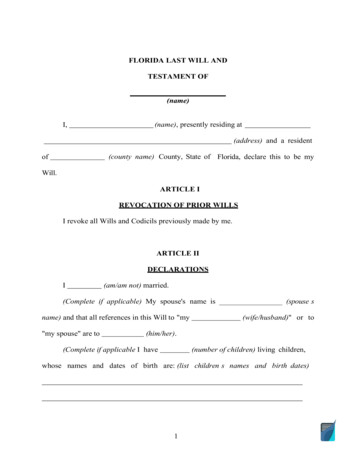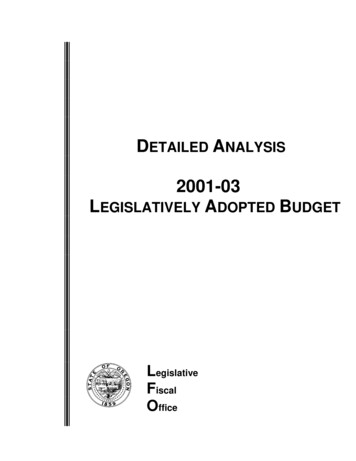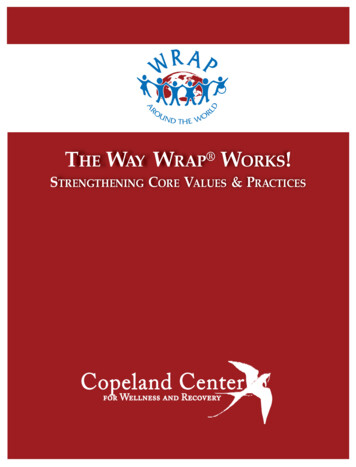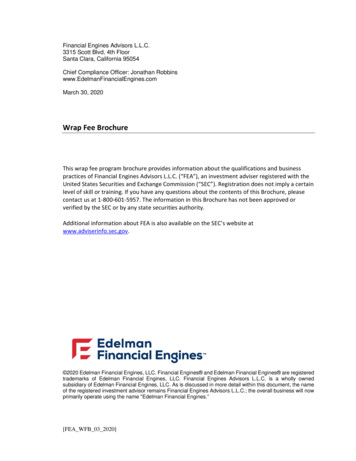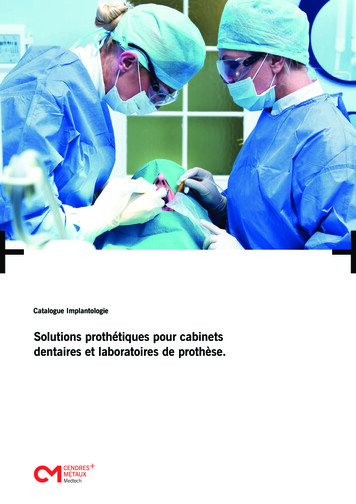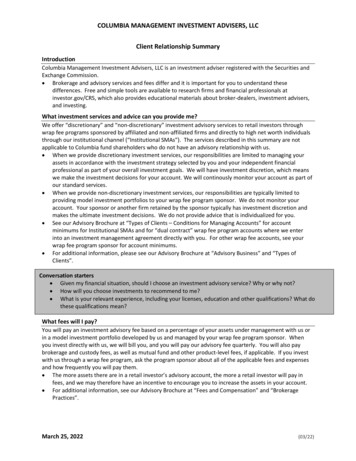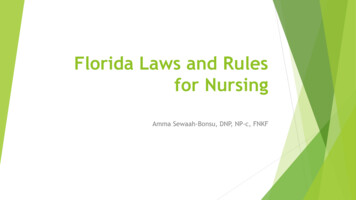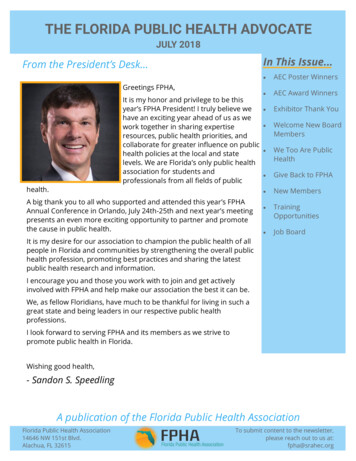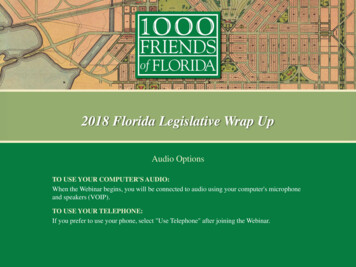
Transcription
2018 Florida Legislative Wrap UpAudio Options O USE YOUR COMPUTER'S AUDIO:TWhen the Webinar begins, you will be connected to audio using your computer's microphoneand speakers (VOIP).TO USE YOUR TELEPHONE:If you prefer to use your phone, select "Use Telephone" after joining the Webinar.
About 1000 Friends of Florida: Founded in 1986, 1000 Friends of Florida is a 501(c)(3)nonprofit membership organization. We work to save special places and build better communities. We educate, advocate and negotiate to protect Florida’s highquality of life. Our bipartisan board of directors includes advocates andexperts from across the state. Visit www.1000friendsofflorida.org/alerts/ to sign up for emailalerts! Please join us at www.1000friendsofflorida.org/donate-now/ Follow 1000 Friends on Facebook and Twitter!
Dr. John M. DeGrove Webinar Series May 4, 1924 – April 13, 2012 Icon of comprehensive planning bothin Florida and across the nation One of the founders of 1000 Friendsof Florida First Secretary of the FloridaDepartment of Community Affairs His accomplishments recognizedwith the John M. DeGrove EminentScholar Chair in GrowthManagement and Development atFlorida Atlantic University To find out more, please visit:www.1000friendsofflorida.org/drdegrove/
Thank you to the Dr. John M. DeGrove Webinar Sponsors:FLORIDA STEWARDArchibald FoundationFRIENDMr. Ronald Book, PACodina Management, LLCMs. Kimberly A. DeGrove and Dr. WilliamPartinWilliam Howard Flowers, Jr. Foundation, Inc.The Perkins Charitable FoundationMr. Robert M. Rhodes
Thank you to the Dr. John M. DeGrove Webinar Sponsors:SPONSORThomas J. BairdMr. William M. DeGroveMs. Susan TrevarthenSUPPORTERAmerican Planning Association, Florida ChapterDoug Crowley Insurance ServicesMr. Russell DeGroveDavid M. OrshefskyMs. Nancy Ellen StroudSynovus -- Tallahassee State BankThomson Brock Luger & Company
Seeking additional sponsors to offer future webinars for free!To underwrite costs associated with Go-to-Webinar,professional certification credits (AICP AND CLE), staff time, etc.Please consider joining with donation levels starting at 35 and up.Or, consider becoming a program sponsor: Florida Guardian -- 5,000President’s Club -- 2,500Friend -- 1,000Sponsor -- 500Supporter -- 250Other amounts gratefully appreciated!You may donate on-line at www.1000friendsofflorida.org/donate-now/(Designate it for DeGrove Education Fund)OREmail vyoung@1000fof.org for more information
This webinar has been approved for: 1.5 AICP CM LEGAL Credits for planners (#9138853)1 CEC for Certified Floodplain Managers2 CLE for Florida attorneys (1708849N – Intermediate).150 CEUs for Florida Environmental Health ProfessionalsThere is a link to a BRIEF SURVEY in the follow-up email youwill receive. Please take a few minutes to give us feedback!
Join us for upcoming webinars:Implementing Complete Streets in Florida TUESDAY, April 24, 2018 from Noon to 1:30 p.m. Approved for 1.5 AICP CM Credits for Planners Professional certification credits sought for Florida attorneys,certified floodplain managers and environmental healthprofessionals but cannot be guaranteedRegister now at:www.1000friendsofflorida.org/webinar/
The PowerPoint is available at www.1000friendsofflorida.org
If you have sound issues:1. Adjust the volumeon your computer2. Adjust the audioon Go-to-Webinar
If you have questions: Your webinar control panelincludes a “Questions” box Please click on “ ” sign andtype any questions in this box Please refer to the slide numberand/or speaker when you postyour question Please keep your questionssuccinct! Staff will ask the presentersquestions, as time permits
Check out our Legislative Webpage!Available lativesession-custom/This site is: Includes what passed andfailed Includes GrowthManagement,Transportation andConservation Legislation Includes links to the bills
Lester Abberger Board Member Emeritus and pastChairman of 1000 Friends of Florida. Chairman of The Trust for Public Land(TPL) Florida Advisory Council, andserves on the TPL National LeadershipCouncil. Chairs the Florida Conservation Campaign,and is a director and chair of the FinanceCommittee. Past Chair of Leadership Florida, TheSeaside Institute, and the City ofTallahassee Urban Design Commission. A graduate of Davidson College, where heserves on the Board of Visitors. A Knight Fellow at the University ofMiami School of Architecture.
Thomas Hawkins Policy and Planning Director for 1000Friends of Florida Teaches courses in land use law atUniversity of Florida Levin College of Lawand College of Design, Construction andPlanning Holds Juris Doctor from Emory UniversitySchool of Law and Master of Science inReal Estate from University of FloridaHough Graduate School of Business
Janet Bowman Senior Policy Advisor for the Florida Chapterof the Nature Conservancy where she focuseson state governmental affairs, Climate Policyand Gulf of Mexico Restoration. Prior to that position, served as LegalDirector of 1000 Friends of Florida, attorneyfor the Senate Community Affairs Committeeand the Legislative Committee onIntergovernmental Relations, and SeniorAttorney for the Department ofEnvironmental Protection. Chair of the Environmental and Land UseLaw Section of the Florida Bar and a frequentspeaker on conservation policy topics. Received her J.D. from the Florida StateUniversity College of Law, and herB.A. from New College of Florida.
Session OverviewLester AbbergerBoard Member Emeritus & Past Chairman1000 Friends of Florida
Legislative Update 3250 bills186 bills passed; fewest in 21 years2721 amendments527 committee meetings
Pervasive Factors Hurricane IrmaSexual Harassment/MisconductParkland Tragedy2018 Politics
Budget Only bill the Legislature is constitutionally required to pass 88.7 billion– 1.4 billion more than Senate– 1.5 billion more than House– 3.8 billion or 3.4% over FY 17-18 Budget Breakdown– Health and Human Services -- 37 billion ( 8.7%)– Education -- 26 billion ( 4.2%)– Criminal Justice -- 4.7 billion– Transportation/Natural Resources -- 14.8 billion– General Government -- 6.2 billion
Preemptions Attacks on local government ‘home rule’ This session:– Tree trimming– Public parks– Puppy mills– Municipal parking garages– Fertilizers– Sanctuary cities– Plastic bags– Vacation rentals– Red light cameras– Community Redevelopment Agencies– Local elections
Other Major Issues Higher Education Texting While Driving Proposed Constitutional Amendment
Constitutional Revision Commission Meeting frequently to meet May 1 deadline for final submissionof ballot proposals 36 remaining proposals
Growth ManagementThomas Hawkins, JD, AICPPolicy & Planning Director1000 Friends of Florida
Passed -- Growth Management
HB 1151 -- Developments of Regional Impact Deletes much of the still existing rule related toDevelopments of Regional Impact Makes changes to the approval process for changes to anapproved DRI development order and require that localgovernments abandon DRI development orders under certaincircumstances.
HB 405 -- Linear Facilities Grants the Public Service Commission, and not localgovernments, sole authority over siting electric transmissionlines Preempts local government authority over electrictransmission line siting and undergrounding
Did Not Pass -- Growth Management
SB 84 would have closed a loophole in state law that allows someIndependent Special Districts to convert to municipalities withoutcomplying with typical requirements for municipal incorporation.T his policy had a brief revival through a Senate amendment to SB1241, the Senate companion to HB 1151. However, thatamendment was not in the adopted version of 1151. SB 324/HB 697 would have set a uniform time for localgovernments to levy impact fees at no sooner than issuance of acertificate of occupancy. SB 362/HB 207 would have require local governments toadopt a private property rights element into theircomprehensive plan.
SB 432/HB 17 would have made changes to CommunityRedevelopment Agencies (CRAs). HB 17 would have terminatedall existing CRAs and would have required a special act of theFlorida Legislature to create a new CRA. SB 432 was lessdraconian. That bill proposed reasonable improvements to CRAethics and procurement standards. SB 1328/HB 987 would have prohibited local governments fromcharging developers of affordable housing the cost to the localgovernment for providing infrastructure to serve that newdevelopment including the cost of roads, schools, parks, water, andsewer service. That prohibition would have undermined localgovernment use of impact fees to fund such improvementsstatewide. Both the Senate and House amended these bills toremove provisions that threatened impact fee programs. However,neither bill passed.
HB 883 -- “Omnibus” growth management bill Citizen calls made a big difference! HB 883/SB 1348 would have made it easier for developers to add landto Community Development Districts (CDDs). Late in the session, the House substituted an omnibus growthmanagement bill for 883. That amended version of 883 would havemade changes to Community Redevelopment Agencies and toDevelopments of Regional Impact (DRIs) as well as to CDDs. In addition, the modified 883 would have created loopholes fordevelopers seeking to develop land designated rural in countieswith urban growth boundaries. None of changes became law. However, the proposed changesto DRIs in the amended 883 were substantially the same as thechanges in law effected by 1151 which passed.
SB 1244/HB 1151 -- Tree Trimming and Removal In their originally filed form, SB 1244/HB 1151 would havepreempted all local government regulation to tree trimming andremoval. 1000 Friends members aggressively opposed these bills whichwould have devastating effects on the tree canopy of communitiesthroughout Florida. Through amendments, both bills became more tailoredpreemptions designed to ensure canals and drainage areas werefree of vegetative obstructions. Neither bill passed.
Did Not Pass -- Transportation
Funding Vetoed: Suncoast Parkway study 1,500,000 expenditure from Florida Department ofTransportation Trust Fund “Develop a proposal to extend the Suncoast Parkway northto the Georgia state line” Would have included map with recommended alignment Would have required all phases to be included in five-yearwork program
SB 116/HB 117 would have improved safety for bicycle operators. SB 176/SB 548/HB 6001 would have prohibited localgovernments from using “red-light cameras” to enforce theirtraffic laws. SB 384/HB 981 would have mandated a study on transportationfunding in response to declining fuel tax revenues due to electricvehicles. SB 572/HB 525 would have made high speed rail operatorsresponse for operational and safety expenses that localgovernments now bear.
SB 688/HB 243 would have limited the use of proceeds from theCharter County and Regional Transportation System Surtax, anoptional sales surtax that some Florida counties may adopt byreferendum, to transit. SB 712/HB 353 would have allowed autonomous vehicles. SB 852/HB 633 would have created a grant program within theDepartment of Transportation to implement innovativetransportation projects including autonomous vehicles. SB 984/HB 807 would change the membership standards formetropolitan planning organization boards.
Environmental Budgetand LegislationJanet BowmanSenior Policy AnalystThe Nature Conservancy
Florida Forever Funding 77,000,000—Environmentally Endangered, Unique 10,000,000—Florida Communities Trust 5,807,500—Rural and Family Lands Program(conservation easements) 2,000,000—Working Waterfronts Program 6,000,000—Florida Recreation DevelopmentAssistance Grants (FRDAP)
Everglades Funding CERP-- 111,072,295Northern Everglades-- 31,000,000Restoration Strategies-- 32,000,000EAA Reservoir-- 64,000,000Dispersed Water Storage-- 5,000,000Herbert Hoover Dike-- 50,000,000 TOTAL: 293,072,295
Other Environmental Appropriations Springs Protection— 50,000,000 St. Johns River Protection-- 20,000,000 Beach Renourishment-- 50,000,000 Hurricane Beach Recovery-- 11,198,282 Florida Resilient Coastline Program-- 3,600,00(contains 1 million for coral reef disease research& monitoring)
Land Management Funding Water Management Districts-- 10,000,000 Division of Forestry-- 6,886,703 DEP/State Lands-- 3,634,992 DEP/State Parks-- 1,825,876 DEP/Greenways & Trails-- 2,2076,436 FWC/Invasive Plant Management-- 31,823,647
Environmental Legislation ThatPassed
HB 53—Coral Reefs Creates the Southeast Florida Coral Reef EcosystemConservation Area. Area defines a conservation “box” to includesovereign submerged lands and state watersoffshore from the St. Lucie Inlet in Martin County tothe northern boundary of Biscayne National Park inMiami-Dade County. Governor Scott has signed the bill -- it takes effectJuly 1, 2018
SB 168—Nonnative Animals Directs Fish & Wildlife Conservation Commission(FWC) to establish a pilot program to addresspriority invasive species. Species targeted for program include: Tegu lizards(Tupinambis); Red Lionfish (Pterios); CommonLionfish (Pterois Miles) and certain conditional orprohibited reptiles. FWC required to submit a report to Governor &Legislature by 1/1/21. Effective date of July 1, 2018 if approved byGovernor. (Deadline of 3/31/18 to sign)
SR 550—Gulf of Mexico Range Complex Resolution to Congress expressing Florida legislativesupport for an indefinite extension of the Gulf ofMexico Security Act restriction on oil and gasleasing: 1) in areas east of the Military Mission Lineestablished at 86’41’ west longitude; and 2) anindefinite extension of the GOMESA Ban on oil andgas leasing within 125 miles of the Florida coastlinein the Eastern Planning Area and a portion of theCentral Planning Area.
CS/HB 703—Water ManagementSurplus Lands Requires wmd’s to provide public notice ofintention to sell surplus lands on its website inaddition to newspaper notice. Allows wmd to offer surplus lands valued at 25,000or less to adjacent property owners defined asowners whose property abuts the parcel. If theparcel is offered but not sold to adjacent propertyowners, the district may sell the parcel to thegeneral public for “the highest price obtainable.”
CS/CS/CS/HB 705—Public Records/WaterManagement District Surplus Lands Exempts from the Chapter 119, the Public RecordsAct, documents related to the valuation of surpluslands. The exemption expires 2 weeks before a contractfor the purchase, exchange or disposal of thesurplus lands is first considered. The public records exemption automatically expiresOctober 2, 2023. If approved by the Governor, takes effect July 1,2018.
CS/CS/HB 1149 Environmental Regulation—Reclaimed Water in CUP permitting Defines use of reclaimed water to create an impactoffset in consumptive water use permitting. Reclaimed water use that may create an offsetinclude: preventing of saltwater intrusion; raisingaquifer levels; improving water quality of an aquifer;or augmenting quality of surface water available forwater supply. Water resource implementation rule must includecriteria by which an impact offset may be applied tothe issuance, renewal, or extension of the utility’sconsumptive use permit.
CS/CS/HB 1149 Environmental Regulation—Reclaimed water DEP and the WMDs must develop and enter amemorandum of agreement providing forcoordinated review of reclaimed water projects. The coordinated review process is performed only ifapplicant requests and should address use of aproposed impact offset. DEP and the WMDs must execute a memorandumof agreement by 12/1/18.
CS/CS/HB 1149 Environmental Regulation—LocalGovernment Recycling Requires local governments to address thecontamination of recyclable material in residentialrecycling contracts. Residential recycling collectors or recoveredprocessing facilities may not be required to collectcontaminated material except pursuant to acontract that defines “contaminated recyclablematerial” and which requiresacceptance/processing of the material. Provision applies to contracts executed after7/1/18.
CS/CS/HB 1149 Environmental Regulation—Permitting and Mitigation An environmental resource permit is not requiredfor the replacement or repair of existing docks thatare located within 5 feet of and no larger than theoriginal dock or pier and will have no additionalimpact on aquatic resources. Provides an exception to the limitations against alocal government creating wetlands mitigation for aproject other than its own to allow use of mitigationareas created by a local government under a permitissued prior to 12/31/11.
CS/CS/HB 1149 Environmental Regulation—C-51Reservoir Project Provides that the operation of Phase I of the C-51reservoir project must follow any operation andmaintenance agreement adopted by the district. Water received into the reservoir from LakeOkeechobee may be available to supportconsumptive use permits if allowed by SFWMDrules. SFWMD may enter into a capacity allocationagreement with a water supply entity for a pro ratashare of unreserved capacity in the reservoir andmay request DEP to waive repayment of loans.
CS/CS/HB 1149 Environmental Regulation—Wastewater Collection Creates a “Blue Star collection system assessment andmaintenance program” to encourage voluntary adoption ofbest practices in operation of wastewater systems toeffective limit sewer overflows.Requires DEP to adopt program certification rules.Identifies certification standards to include periodiccondition assessments, documentation of reinvestment inmaintenance and repair of systems, enactment of localcodes requiring private pump stations to meet standards anda power outage contingency plan.Program certifications expire in 5 years.
CS/CS/HB 1149 Environmental Regulation—BlueStar Wastewater Program Incentives Requires DEP to allow public and private, nonprofit utilitiesto participate in the Clean Water State Resolving FundProgram.Allows DEP to reduce penalties for sanitary sewer overflowbased on utility’s status as a certified Blue Star utility orbased on the utility’s investment in assessment andmaintenance activities to prevent overflows.DEP must provide a wastewater utility with a presumption ofcompliance with state water quality standards for pathogenswhen utility has history of compliance with disinfectionrequirements.
CS/CS/HB 1149 Environmental Regulation—BlueStar Utility Permitting Blue Star utilities shall be issued a 10-year permit by DEPunder same conditions as a 5-year permit.DEP may reduce the amount of a penalty based on theutility’s investment in the maintenance, rehabilitation orexpansion of the facility.Allows DEP to award Small Community Sewer ConstructionAssistance Program grants to private, nonprofit utilities (inaddition to public utilities) providing wastewater tofinancially disadvantaged small communities. DEP may waivepopulation requirement for independent special districtsthat serve less than 10,000 people in rural areas ofopportunity.Bill effective upon becoming law.
HB 7043—State Assumption of Federal Section 404Dredge & Fill Permitting Authority Authorizes DEP to seek a delegation of section 404of the Clean Water Act to regulate the discharge ofdredge or fill material into navigable waters. Creates a definition of “state assumed waters” tomean waters of the United States that the stateassumes permitting authority over. The Army Corpsof Engineers retains jurisdiction over tidal watersand their adjacent wetlands and waters historicallyor presently used for interstate or foreigncommerce.
HB 7043—State Assumption of Federal Section 404Dredge & Fill Permitting Authority—PermitTimelines Exempts DEP from meeting the permit processingdeadlines that are applicable to stateEnvironmental Resource Permits. (“ERPs”) Limits time period of state administered 404permits to no more than 5 years. If a timelyapplication for reissuance is filed, the existing 404permit does not expire until DEP takes final actionon the application or until last day for seekingjudicial review of the agency order.
HB 7043—State Assumption of Federal Section 404Dredge & Fill Permitting Authority Authorizes applicants for a state administeredsection 404 to petition the circuit court to requireDEP to make a decision if a decision is not madewithin time required by federal law, ormemorandum of agreement. Qualifies that provisions of state law which conflictwith federal requirements do not apply to stateadministered state 404 permits; however, theapplication of state law to further regulate in stateassumed waters is not prohibited if it does notconflict with federal requirements.
HB 7043—State Assumption of Federal Section 404Dredge & Fill Permitting Authority—Expeditedpermit review. Requires DEP to adopt by rule an expedited permitreview process that is consistent with federal lawfor reissuance of permits where there has been nomaterial change to scope of project. Allows DEP to delegate administration of the stateadministered section 404 permitting program (e.g.to wmds) if allowed by federal law. Bill takes effect upon becoming a law. (Deadline3/29/18 to sign)
CS/CS/HB 1173—Lands Used for GovernmentalPurposes—Military Base Buffering Following the acquisition of military base buffer lands, theBoard of Trustees of the Internal Improvement Trust Fund isauthorized to convey or lease the land to the militaryinstallation at less than appraised value.Military base buffer lands can also be leased by the BOT atrates determined by competitive bid to private entities toconduct agriculture or silviculture.Conveyances to the military at less than appraised valuemust revert to the BOT if land not used for intendedpurposes.Requires DEP to request by October 1st annually that militaryinstallations to provide a list of base buffering encroachmentlands for potential acquisition.
CS/CS/HB 1173—Lands Used for GovernmentalPurposes—Areas of Critical State Concern Allows the BOT to direct DEP, Division of StateLands, to purchase lands on an immediate basis thatwill satisfy private property rights claims resultingfrom limitations imposed by an Area of Critical StateConcern. Allows the BOT to waive or modify land acquisitionprocedures for these lands and to use comparablesales analysis rather than appraisals if parcel worthless than 500,000.
CS/CS/HB 1173—Lands Used for GovernmentalPurposes—Flood Risk Reduction & Florida Forever Adds to the list of Florida Forever performance goals, themitigation of the effects of natural disasters and floods indeveloped areas, based on factors including: the number ofacres acquired within a 100-year floodplain or coastal highhazard area; the number of acres acquired to serve dualfunctions flow ways and greenways for public recreation; andthe percentage of land that creates additional open space andbuffer areas while precluding rebuilding in areas thatrepeatedly flood. Florida Communities Trust program criteria are amended toallow dual function projects that reduce flood risk.
CS/CS/HB 1173—Lands Used for GovernmentalPurposes—Affordable Housing Adds the provision of affordable housing and theprotection and improvement of water quality of theApalachicola Bay Area to list of goals forApalachicola Bay Area of Critical State Concern. Allows a land authority created within an area ofcritical state concern to use tourist impact taxes topay costs related to acquiring property for andconstructing affordable housing. Bill takes effect upon becoming a law.
HB 7033—LATF & Department of State The bill recreates the Land Acquisition Trust Fundwithin the Department of State that would haveotherwise terminated July 1, 2019. If approved by the Governor, the bill takes effectJuly, 1, 2018
HB 7035—Ratification of St. JohnsWater Management District Rules The bill ratifies Florida Administrative Code Rule40C-2.101, F.A.C., promulgated by the St. JohnsRiver Water Management District, which includesregulatory measures that are a component of theSilver Springs recovery and prevention strategy toensure that the recently adopted minimum flowsand levels are not exceeded in the future. Governor Scott has signed the bill -- it is effectiveupon becoming law.
Bills that Failed
SB 370—Florida Forever Would have allocated 100 million/year of LandAcquisition Trust Fund money to the Florida ForeverTrust Fund. Prohibited LATF funds from being used for certainadministrative and information technologyexpenses at DACS, DEP and FWC. Bill passed the Senate and died in messages.
CS/CS/CS HB 7063—Natural Resources Included Florida Forever provisions that would haverealigned funding categories so that 1/3 of yearly FloridaForever funding would be allocated for critical landsacquisition, 1/3 for the Rural and Family Lands Program and1/3 for Florida Communities Trust.Contained a Florida Forever funding allocation that started at 57 million in FY 2019-2020 and increasing to 200 million byFY 2029-2039 in relation to decreasing amount of debtservice on Florida Forever bonds.Bill died on the House Calendar.
SB 462—Advanced Well Stimulation Bill sought to ban advanced well stimulationtreatments, “fracking,” in Florida. Bill died in Senate Appropriations and companionbill never heard in the House.
Questions and Answers
If you have questions: Your webinar control panelincludes a “Questions” box Please click on “ ” sign andtype any questions in this box Please refer to the slidenumber and/or speaker whenyou post your question Please keep your questionssuccinct! Staff will ask the presentersquestions, as time permits
The PowerPoint is available at www.1000friendsofflorida.org
This webinar has been approved for: 1.5 AICP CM LEGAL Credits for planners (#9138853)1 CEC for Certified Floodplain Managers2 CLE for Florida attorneys (1708849N – Intermediate).150 CEUs for Florida Environmental Health ProfessionalsThere is a link to a BRIEF SURVEY in the follow-up email youwill receive. Please take a few minutes to give us feedback!
Check out our Legislative Webpage!Available lative-sessioncustom/This site is: Includes what passed and failed Includes Growth Management,Transportation and ConservationLegislation Includes links to the bills
Seeking additional sponsors to offer future webinars for free!To underwrite costs associated with Go-to-Webinar,professional certification credits (AICP AND CLE), staff time, etc.Please consider joining with donation levels starting at 35 and up.Or, consider becoming a program sponsor: Florida Guardian -- 5,000 President’s Club -- 2,500 Friend -- 1,000 Sponsor -- 500 Supporter -- 250 Other amounts gratefully appreciated!You may donate on-line at www.1000friendsofflorida.org/donate-now/(Designate it for DeGrove Education Fund)OREmail vyoung@1000fof.org for more information
Join us for upcoming webinars:Implementing Complete Streets in Florida TUESDAY, April 24, 2018 from Noon to 1:30 p.m. Approved for 1.5 AICP CM Credits for Planners Professional certification credits sought for Florida attorneys,certified floodplain managers and environmental healthprofessionals but cannot be guaranteedRegister now at:www.1000friendsofflorida.org/webinar/
Please support 1000 Friends of Florida:www.1000friendsofflorida.org/donate-now/If you would like your donation to support 1000 Friends’webinars, please allocate your donation to the DeGroveEducation FundAMAZON SMILEhttp://smile.amazon.com/ch/59-2761163
University of Florida Levin College of Law and College of Design, Construction and . Real Estate from University of Florida Hough Graduate School of Business. Janet Bowman Senior Policy Advisor for the Florida Chapter of the Nature Conservancy where she focuses on state governmental affairs, Climate Policy
